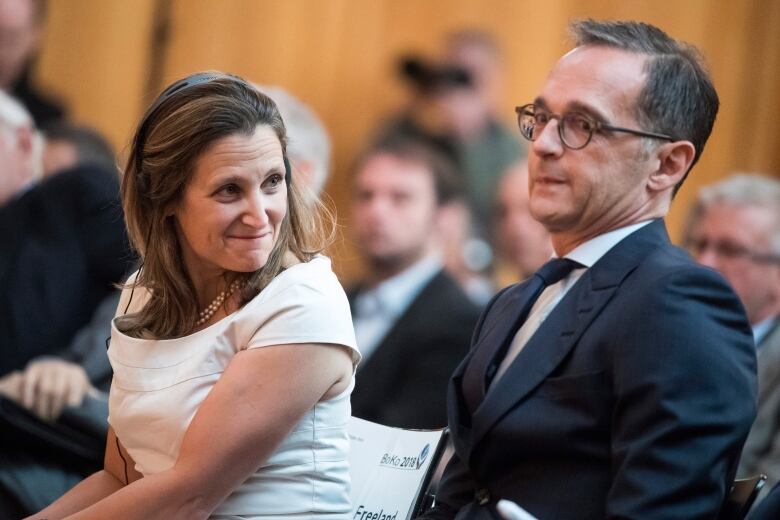Trump's threat of a bilateral deal with Mexico may be empty. Here's why
Mexico says it's doing everything it can to help Canada, but 'certain variables' are beyond its control

As news broke Monday of a U.S.-Mexico breakthrough in the NAFTAtalks, the Canadian government's statements to the media all ended with the same line: "Canada's signature is required."
But is it, really?
Or could U.S. President Donald Trump get his U.S.-Mexico Free Trade Agreement after all, cutting Canada out?
Legal opinions are split on whether Trump has the authority to go it alone with Mexicoor whether the U.S. is obligated to continue negotiations with three parties.
No matter how many times senior Mexican and Canadian officials or even influential Republicans reassureCanadians the North American Free Trade Agreement will remain trilateral, it's hard to calm nervous stomachs when Trump offers brash musingslike this:
"I think with Canada, frankly, the easiest thing we can do is do tariffs on their cars coming in," Trump told reportersMonday.
"It's a tremendous amount of money and it's a very simple negotiation that could end in one day, and we take in a lot of money the following day. But I think we'll give them a chance to probably have a separate deal. Or we could put [Canada]in this deal."
Notice how the only optionfor which the Trump administration has Congressional authority is mentioned last almost as a finalresortinstead of what it was supposed to be: the primary mission for negotiators over the last 12 months.
CBC's Rosemary Barton fact checks some of Trump's statement about the bilateral trade with Mexico:
Canada wasn't at the table for the last month, so it's unclear how much it knew in advance. But it boils down to this: asuggested agreement in principle is on the table. Trudeau's government has to decide whether it wants inand on what terms.
If it does want in and Foreign Affairs Minister ChrystiaFreelandsounded upbeat about the progress toward that outcome as she arrived at talks in D.C. Tuesday Trump's threat to keepCanada outwill be hard to execute
'This is real'
"Recall thatNAFTArequires six-month notice before a withdrawal," Jennifer Hillman, aformer general counsel in the U.S. Trade Representative's office wrote on Twitter.
What's more, the U.S. Congress hasn't been notified of a bilateral deal with Mexico, she said.
If the U.S. wants to pull out of NAFTA and turn its "preliminary agreement in principle" into a bona fide trade deal, there's a process for that, but Trump hasn't been following it.
Lighthizer says letter to Congress notifying them of intent to sign agreement with Mexico (and maybe Canada?) will be sent Friday (8/31). 90 days later (Nov 29) agreement can be signed ONLY IF the text is released by September 30. Not clear if text is agreed upon or close. pic.twitter.com/woBs1d1xwF
—@JAHillmanGULawBut maybe it's wrong to assume the Trump administration cares about the process it's supposed to follow.
Met by reporters outside the White House Tuesday morning, the head of Trump's economic councilwaved off suggestions that Trump's bilateral approach isn't legitimate as far as Congressional approval is concerned.
"Are we going to go through legalese?" LarryKudlowsaid, acknowledging he's "not a trade lawyer."
"You've got to have some patience! This is real! Believe me. Don't think this is something that's somehow going to go away. It's not."
American officials acknowledgethey need a creative workaroundto get a deal with Mexico alone.
"How you do that is something that we're still in the process of looking at ... just as a technical matter,"one U.S. official said Monday on the condition of anonymity.
Even if Congress is enticed to approvea trade deal with Mexico alone, the original NAFTA has to be terminated first.
American legal expertsare split onwhether Trump's executive powers allow him to terminate NAFTAwithout Congress.
Rules-based system?
International trade rules ones the U.S. helped establish at the World Trade Organization were supposed to discourage protectionist measuressuch as last spring'ssteel and aluminum tariffs.
And yet, the Trump administration carried on, relishingthe threat of tariffsas leverage in negotiations not only with Canada and Mexicobut also other key trading partners, such as South Korea and the European Union.
In other words, established rules and processes might not be enough to stop the Trumpadministration from doing something it's determined to do.
But that doesn't mean Canada's helpless here. Trade negotiations involve not only law, but politics.
Before Monday's announcement, Canada and Mexico seemed to bepursuinga "hang together or hang separately" philosophy, vowing as recently as last month not to settle for bilateral deals.
But then came the August invitation to Mexico alone to come to Washington for what turned out to be a marathon negotiating session, now in its fifth week. Canadians were told it was meant to break the U.S.Mexico logjam in the automotive chapter of trade talks. It now appears to have been so much more.
'Do what's right for Mexico'
Outgoing Mexican President Enrique PenaNieto dialledintothe Oval Office for Trump's announcementMonday. He noted Canada's absence several times. But he alsocongratulatednegotiators as if something had been finalized.
Did this signal a betrayal?
Mexico's ambassador to Canada,Dionisio Perez Jacome, told CBC News Network'sPower & Politicsthe Mexicans will do everything they canto help Canada, but "certain variables we don't control."
Thatechoed Foreign Minister LuisVidegaray'sMonday claimthat"we put all our effort, 24/7, to promote that Canada continues to be a part of this agreement."

One U.S. official summed it up this way: "Mexico is in a position where they want to protect their markets, and they'll hopefully do what's right for Mexico."
If NAFTAfell apart, the official said, the Mexicans still have an agreement with Canada: the revised (now without the U.S.) Comprehensive and Progressive Agreement for Trans-Pacific Partnership, or CPTPP.
Videgaraymay have meant to be reassuring when he saida failure on Canada's part to finish negotiations this week "does not preclude the possibility of Canada joining later."
The problem with joining "later," in the world of international trade negotiations, is that the price of admission typically goes up, not down.
Will Congress help?
What does work in Canada'sfavour is time.Canada's next federal election is a year outwhile the U.S. and Mexico have more urgent politicalconcerns.
If an agreement isn't reached in time for the Pena Nietogovernment to sign on its way out the door, the next, more nationalist and left-leaning administration in Mexico might want to change it.
The Trump administration, for its part, needs to look like a successful trade deal-maker in the face of its critics running for Congress in November'smidterm elections.

Canada'sfriends in Congress have spoken out on its behalf this week.
But words are not deeds: with the exception of one non-binding vote in the Senate earlier this summer, none of the legislation that would begin to tie Trump's hands on trade has passed.
U.S. Trade Representative RobertLighthizerwants to crafta deal that gets"overwhelming support" from bothDemocrats and Republicans.
Parts of what Mexicoagreed to seemtailored to appeal to Congress: union-backed Democrats wanttoughlabour regulations forMexico; politicians who receive significant backing from the pharmaceutical industry backlonger drug-exclusivity periods.
But time might havealready run out for this Congress tovoteon NAFTA'ssuccessor agreement.As midterms approach, the trade skepticismthatpropelled Trump into office hasn't gone away.
For now, Canada's back at the table in Washington, with some tough decisions ahead.













_(720p).jpg)


 OFFICIAL HD MUSIC VIDEO.jpg)
.jpg)



























































































